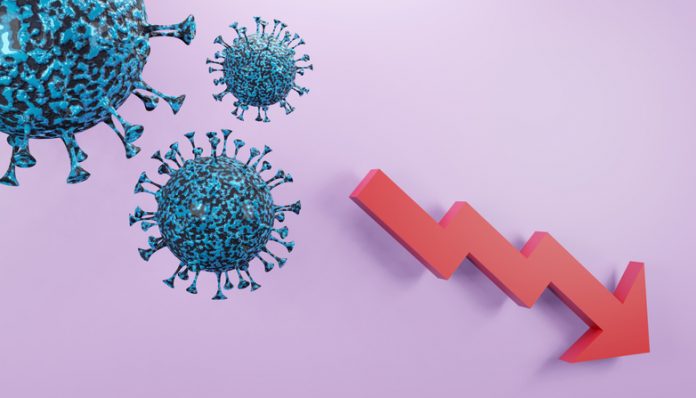The rate of COVID-19 deaths is slowing—but should vaccines get all the credit?
On May 16, Texas reported zero COVID deaths for the first time since March 2020. Other states, including Idaho, Minnesota, and Wisconsin, have had days without COVID deaths. These zero-death days are a welcome sign that the worldwide pandemic is finally waning.
Operation Warp Speed allowed COVID-19 vaccines to be developed in record time. But public health officials and politicians question whether vaccine distribution is the primary reason deaths attributed to the virus are down.
Natural Immunity
Natural immunity and seasonal shifts in communicable disease rates deserve much of the credit, says Jane Orient, M.D, executive director of the Association of American Physicians and Surgeons.
“The whole emphasis now is getting bioengineered foreign genetic material—messenger RNA surrounded by lipid nanoparticles by Pfizer or Moderna, or DNA carried in an adenovirus by J&J or AstraZeneca—into everyone’s arm,” Orient said. “People are rarely being tested for immunity—antibodies against SARS-CoV 2 or the more important T cells.”
Millions of Americans developed natural immunity during bouts with the virus, Orient says. Many may have been asymptomatic and could be getting the vaccine unnecessarily.
Meanwhile, a number of new COVID patients have already received the vaccine, according to Harvey Risch, M.D., Ph. D., a professor of epidemiology at the Yale School of Medicine and Public Health during an interview. (See related article, page 11).
Although it is not clear why vaccinated individuals got sick with COVID-19, Anthony Fauci, M.D., President Biden’s chief advisor or COVID-19 has been supportive of the mass vaccination effort.
“Vaccines are highly efficacious,” Fauci said at a White House briefing on May 5. “They are better than the typical response you get from natural infection.”
Helpful Summer Weather
The arrival of summer weather is also partly responsible for the decrease in hospitalizations and deaths, according to Martin Kulldorff, Ph.D., professor of medicine at Harvard Medical School, in an interview with the Epoch Times. Of course, the decline in COVID deaths is “good news,” states Kulldorff—but vaccines are not the sole reason the pandemic is abating.
“One [reason] is that we have a lot of immunity in the population, mostly from natural disease but also from the vaccines,” Kulldorff said. “We also know that it’s a seasonal disease. So, the decline in March and April was mostly due to immunity but now, in May, seasonality has also helped.”
Consistent Vaccine Hesitancy
The decline in COVID-19 cases and deaths is happening despite vaccine hesitancy. States are providing numerous incentives for people to get vaccinated, offering things like free donuts, cash cards, and entry into $1 million or more sweepstakes (see related article, page 11). Members of the Biden administration have stated it aims to vaccinate 70 percent of American adults by July 4. Yet, states are turning down additional vaccine supply.
Orient points out who is hesitant to get the vaccine and why.
“More than half of police officers, the majority of detained or incarcerated persons, nearly 40 percent of U.S. Marines, and in some areas more than half of health care workers would decline to get the jab without coercion,” Orient says in reference to a report on May 3 in The Crime Report. “An online survey conducted by the scientists of Johns Hopkins Bloomberg School of Public Health showed that about 41 percent of U.S. residents were unwilling to receive the shots. The main reason is concern about safety.”
Concerns over how effective the vaccines are in stopping the spread of infection could also be stalling interest in the vaccine. The U.S. Centers for Disease Control and Prevention (CDC) has not stated exactly how effective the vaccines are at stopping transmission. Although acknowledging that vaccinated people can gather without masks in groups of other vaccinated people, the CDC recommends abiding by many pre-vaccine protocols.
“We are still learning how vaccines will affect the spread of COVID-19,” the CDC said on its “Benefits of Getting Vaccinated” webpage. “Until we know more about how vaccines will affect the spread of COVID-19, people who are fully vaccinated against COVID-19 should keep taking precautions in public places like wearing a mask, staying 6 feet apart from others, avoiding crowds and poorly ventilated spaces, and washing your hands often.”
A number of vaccinated people aren’t acting as if they are immune, Orient says.
“They wear masks, and the majority are still unwilling to go to a party (especially with the unvaxxed), go on an airplane, or rent a car,” Orient said. “CDC guidelines also reflect this uncertainty. COVID cases and even deaths in the fully vaccinated are still being reported.”
Ashley Herzog (aebristow85@gmail.com) writes from Avon Lake, Ohio.





















